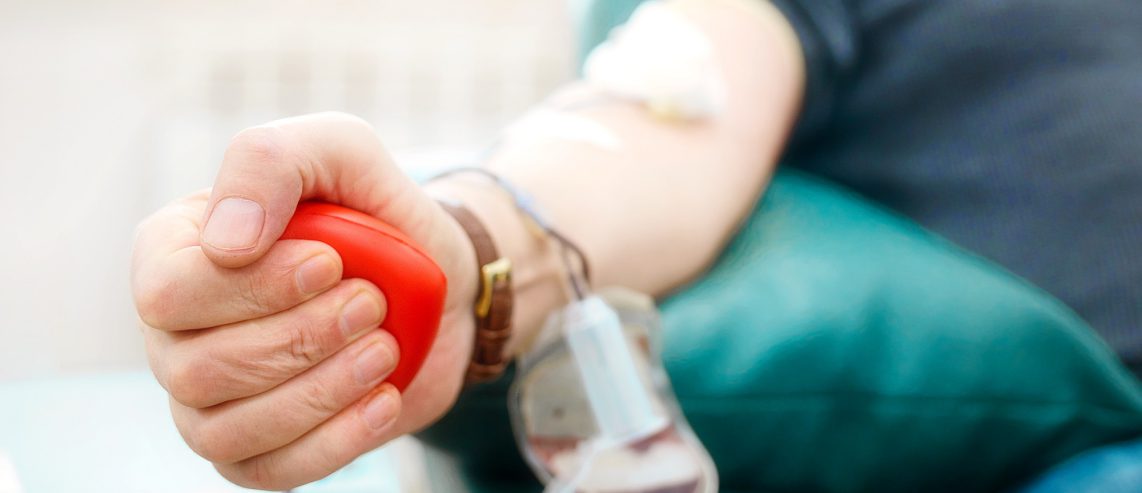Despite online misinformation, receiving blood from people who received the COVID-19 vaccine donated is safe. Receiving blood from people who had a past COVID-19 illness and recovered is also safe. COVID-19 does not transmit through blood, and neither does its vaccine.
According to the British Journal of Haematology, U.S. patients are refusing blood based on the donor’s COVID-19 vaccination status or infection. Reasons include the belief that they can get infected through a blood transfusion and distrust of the COVID-19 vaccine.
But blood donors and donated blood products both go through rigorous screening. Receiving donated blood is safe no matter the person’s COVID-19 vaccination or infection history.
“The community blood supply has been extensively tested, validated, and essentially pedigreed,” says Joseph Kiss, MD, professor of medicine, Division of Hematology/Oncology, University of Pittsburgh, and medical director, Clinical Apheresis and Blood Services, Vitalant. “We know that this is as-safe-as-possible blood.”
Learn more about the blood donation process and why donated blood is safe.
How Do I Know Donated Blood Is Safe?
Pre- and post-donation screening help to ensure blood product safety for recipients.
Before giving blood, a prospective donor must answer a long list of questions about their medical history. Those include questions about recent infections, recent vaccinations, and overall health. Donors who are in good health and did not recently receive a “live” virus vaccine like chickenpox or rubella are generally eligible to donate.
“There’s over 50 questions that they answer regarding their own risk factors and the potential for them being infectious,” Dr. Kiss says.
After going through this process, potential donors get a finger stick to test their hemoglobin level. If their hemoglobin level meets donation standards, they can donate.
When a person donates blood, the blood bank screens the blood product. This includes typing the blood and testing it for infectious diseases like HIV, hepatitis, West Nile, syphilis, and more. If it tests positive for one of those diseases, they discard it.
“There’s a full range of tests that we initiate, and all those have to be negative,” Dr. Kiss says. “All those boxes have to be checked that they’re negative before that blood donor unit is qualified for release to a hospital and for transfusion.”
Earlier in the pandemic, donated blood also got screened for COVID-19 antibodies. But that screening no longer takes place, Dr. Kiss says.
Never Miss a Beat!
Subscribe to Our HealthBeat Newsletter!
Thank you for subscribing!
You can now select the specific newsletters you'd like to receive.
You are already subscribed.
Subscribe to more newsletters in our email preference center.
Sorry, an error occurred. Please try again later.
Get Healthy Tips Sent to Your Phone!
Can I Get COVID-19 From a Blood Transfusion?
No, you cannot get COVID-19 from receiving donated blood. SARS-CoV-2, the virus that causes COVID-19, is a respiratory virus. COVID-19, therefore, spreads most often through respiratory droplets between people in close contact. There have been no reported cases of COVID-19 caused by blood transfusions.
“One of the facts that we learn very early on in any new or relatively new viral infection is we do assess the possibility that that infection could be carried by blood transfusions,” Dr. Kiss says. “Fortunately, the SARS respiratory viruses do not have an active blood phase in terms of their infectious potential. It can’t be transmitted by blood.”
Is Getting Blood From Someone Who Had COVID-19 Safe?
Yes, getting blood from someone who had COVID-19 and has since recovered is safe.
People with a current COVID-19 infection must defer donating blood until they are symptom-free and considered healthy. Vitalant requires that donors are symptom-free for 10 days after having COVID-19 in order to donate blood. Other systems have similar waiting periods.
Is Getting Blood From Someone Who Got Vaccinated for COVID-19 Safe?
Yes. Despite online misinformation, there are no ill effects caused by receiving the blood of someone vaccinated against COVID-19. The COVID-19 vaccine is safe.
“Scientific evidence does not substantiate this belief on the part of some people that those who have been vaccinated somehow transmit components of the vaccine to another individual,” Dr. Kiss says.
How Soon Can Someone Donate Blood After Getting the COVID-19 Vaccine?
There is no deferral period for donating blood after getting the COVID-19 vaccine.
There is a deferral period for donating blood after getting some live virus vaccines, such as chickenpox, measles, mumps, rubella, and shingles. But because the COVID-19 vaccine is not a live virus vaccine, there is no waiting period.
“These are all carefully vetted in infectious disease settings and reviewed by the FDA,” Dr. Kiss says.
“Knowing it’s safe to receive donated blood is good news for individuals who are unable to accept blood transfusions for personal, ethical, or blood safety concerns,” says Deborah Tatro, bloodless medicine patient advocate in the UPMC Patient Blood Management Program. “Concerns heightened since the COVID-19 pandemic, but this information is helpful as we provide guidance to physicians and patients on appropriate blood management strategies.”
Can I Get a Directed Donation?
Dr. Kiss says because of fear of COVID-19 and mistrust in the COVID-19 vaccine, he’s seen more people asking for directed blood donations.
Although in some rare cases directed donations are necessary — such as in cases with very rare blood types — Dr. Kiss says directed donations are not needed in most cases. In terms of COVID-19 and the vaccine, directed donations are not safer than the community blood supply, he says.
“There is no sound scientific principle behind the belief that those who are unvaccinated, that somehow that is a safer blood product than those who have been vaccinated or those who have had COVID infections and have COVID-specific antibodies,” Dr. Kiss says.
“There’s a mistaken belief that a blood product from someone you know is safer than the community blood supply. And there is a mistaken belief that people that you know somehow are safer. But that’s not been shown to be the case from a scientific and medical standpoint.”
The bottom line is that it is safe to receive blood from donors who got the COVID-19 vaccine and those who have recovered from COVID-19.
Blood donations are always crucial in providing lifesaving care. To learn more about the benefits of donating blood or becoming a donor, visit Vitalant online.
Editor's Note: This article was originally published on , and was last reviewed on .
Sources
Jeremy W. Jacobs, Lorin A. Bibb, Bipin N. Savani, and Garrett S. Booth, British Journal of Haematology, Refusing Blood Transfusions From COVID‐19‐Vaccinated Donors: Are We Repeating History? Link
About UPMC
Headquartered in Pittsburgh, UPMC is a world-renowned health care provider and insurer. We operate 40 hospitals and 800 doctors’ offices and outpatient centers, with locations throughout Pennsylvania, Maryland, New York, West Virginia, and internationally. We employ 4,900 physicians, and we are leaders in clinical care, groundbreaking research, and treatment breakthroughs. U.S. News & World Report consistently ranks UPMC Presbyterian Shadyside as one of the nation’s best hospitals in many specialties and ranks UPMC Children’s Hospital of Pittsburgh on its Honor Roll of America’s Best Children’s Hospitals. We are dedicated to providing Life Changing Medicine to our communities.

